

Revision note: We have further updated our biographical sketch on Porter Kilbert, to include his Sonora date with Coleman Hawkins and his appearance on Jimmy Woode's Argo LP. We have found two mentions of Ping 1007 in Cash Box (March 30 and May 25, 1957) and a valedictory advertisement in Billboard (April 20). We have updated our coverage of Ping 1000 through 1003; all four, amazingly for such a tiny operation, were advertised and reviewed in Cash Box. We have found an early mention of Malachi Favors—from February 1949, when he was enrolled at Maryland State and was playing in the Maryland State Collegians. We have added some detail about Porter Kilbert's activities in 1953.
Ping Records was one of those short-lived independents. According to Robert Pruter in his book Doowop: The Chicago Scene, it was founded in October 1956 by Frank Evans, who owned a record store at 4648 South Cottage Grove in Chicago, and owned and serviced jukeboxes. The tiny operation was run out of the back of the store. It opened in October 1956 and probably expired in June 1957, lasting less than a year.
Ping releases (all singles) ran from 1000 to 1007. Six have been documented. There is no evidence that a Ping 1004 or a Ping 1006 was issued. Meanwhile we know four more sides were supposedly recorded for Ping that were never released; two of these survive on test pressings.
According to Homer Talbert, Ping was originally intended to have a sister label called Pong that would feature jazz records. But nothing came of those plans.
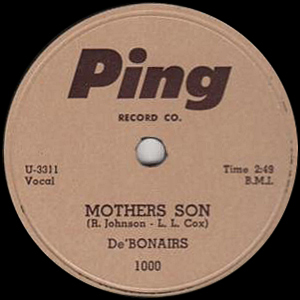
The label came into being at the urging of Lawrence "Legree" Cox, the manager of a doowop group called the De'bonairs. The De'bonairs and their unusually distinguished backup (the Andrew Hill Combo) cut 8 tracks at a big session. This one session is a microcosm of the postwar Chicago scene: the same musicians backed four doowop numbers, then produced two hard bop piano trios and two R&B-influenced jazz instrumentals.
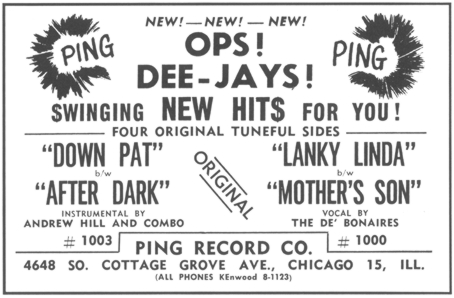
The De'bonairs started in 1953, when all five members were attending Carver High School. In 1955, DJ Herb Kent, the Kool Gent, referred them to Lawrence Cox, who became their manager. In a letter to Big Joe Louis, dated November 16, 1987, Homer Talbert stated that the De'bonairs were Ralph Johnson, William "Sonny Boy" Nelson," Earl "Poochie" Vanorsby, Virgil "Nip" Talbert, and Homer "Pepi" Talbert. In a letter to Big Joe Louis of October 8, 1987, Lawrence Cox gave the same lineup. However, the original group, which was still together when the De'bonairs recorded for Ping, had Edward Johnson (not related to Ralph Johnson) singing bass. Homer Talbert would replace him later on.
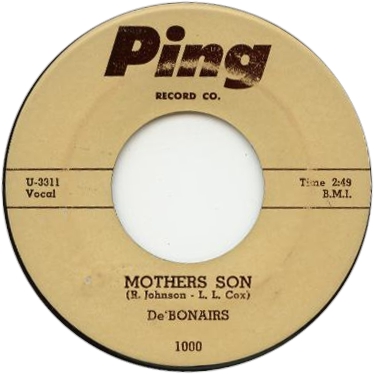
The De'bonairs: Ralph Johnson (lead); Virgil Talbert (first tenor); William "Sonny" Nelson (second tenor); Edward Johnson (bass); Earl Vanorsby (baritone); acc. by the Andrew Hill Combo: Earl Lavon "Von" Freeman (ts); Laurdine "Pat" Patrick (bars); Andrew Hill (p except -1); Malachi Favors (b); Wilbur Campbell (d except -1).
Universal Recording, Chicago, late October 1956
| U-3310 | Lanky Linda (F. Evans-L. L. Cox) | Ping 1000 | |
| U-3311 | Mothers Son [sic] (R. Johnson-L. L. Cox) -1 | Ping 1000 | |
| U-3312 | Say a Prayer for Me (L. L. Cox) | Ping 1001 | |
| U-3313 | Cracker-Jack Daddy (L. L. Cox) | Ping 1001 |
The lineup of the De'bonairs on this session comes from Robert Pruter, Doowop: The Chicago Scene.
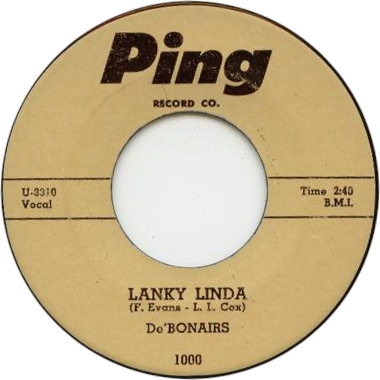
Ping 1000, "Mother's Son" b/w "Lanky Linda" (45 and 78 rpm) was released in late November 1956. Ping released items from its first session in two waves: 1000 and 1003 in late November, and 1001 and 1002 in early December. On November 24, 1956, Ping, said in Cash Box to be looking for distributors (p. 32; did it find any?), ran an ad for 1000 and 1003 (p. 34). There was a parallel ad in Billboard (November 24, 1956, p. 44). The company advertised all four singles from this session in Cash Box for December 8, 1956 (p. 50).
Cash Box reviewed Ping 1000 on December 8, 1956 (p. 48); the reviewer liked "Lanky Linda. The saxes are prominent on both sides and get brief solos on "Linda." Malachi Favors plays a recognizable bass lead-in to "Mother's Son," and supports the entire performance on his own (his string bass is recorded much more prominently than any other instrument, and neither piano nor drums can be heard on the side). According to Ralph Johnson in his interview with Robert Pruter, "Mother's Son" was really by Johnson-Cox.
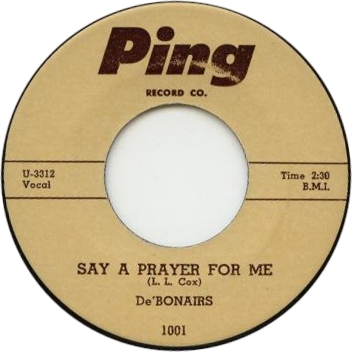
Ping 1001 was released on 78 and 45 in early December 1956, in the company's second wave. Cash Box reviewed it on December 29, with the more favorable rating going to "Cracker-Jack Daddy" (p. 38)
There are "repros" of both 1000 and 1001; those we have seen have black labels with white print, which makes them easy to distinguish from the original releases.
In an interview with Pruter, Ralph Johnson placed the session at the Chess Studios, but the matrix numbers are from one of the Universal Recording series, and both Lawrence Cox and Homer Talbert in their letters to Big Joe Louis placed the proceedings at Universal. Besides, we know from Nadine Cohodas's book, Spinning Blues into Gold: The Chess Brothers and the Legendary Chess Records (St. Martin's, 2000) that the Chess Studios at 2120 South Michigan Avenue weren't open and ready for business till June of 1957.
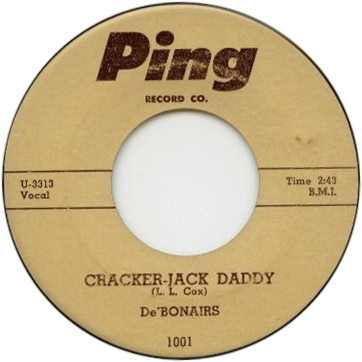
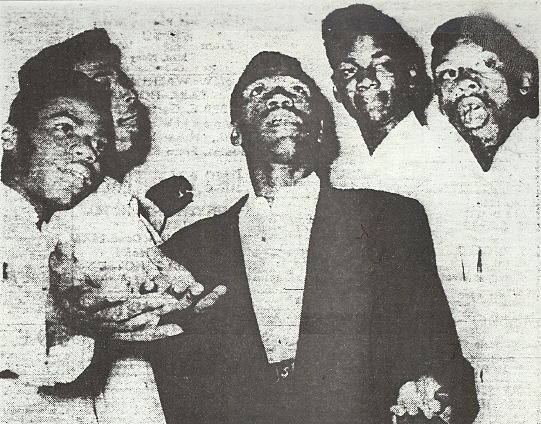
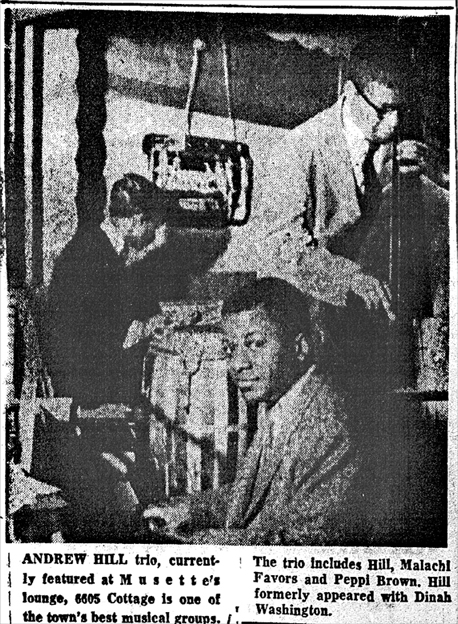

Same personnel and session: Von Freeman (ts except -1); Pat Patrick (bars except -1); Andrew Hill (p -1, 3; org -2); Malachi Favors (b); Wilbur Campbell (d).
| U-3314 | Dot (Hill-Dot) -1 | Ping 1002 | |
| U-3315 | Mal's Blues (Hill) -1 | Ping 1002 | |
| U-3316 | After Dark (Freeman)* -2 | Ping 1003 | |
| U-3317 | Down Pat (Patrick)^ -3 | Ping 1003 |

Ping 1002 and Ping 1003 were released in 45 and 78-rpm formats. Ping 1003 was out in the first wave, advertised in Cash Box on November 24, 1956 and reviewed on December 1, 1956 (p. 38; the reviewer didn't give it as high a rating as either of the vocal releases). Ping 1002 was in the second wave, advertised in Cash Box on December 8, 1956. Unfortunately, "Mal's Blues" came out in this ad as "Mel's Blues." The Cash Box review (more positive than for Ping 1003) appeared on December 22, 1956 (p. 39). Our information about Ping 1002 derives from a dub (ultimately from Billy Vera's 45-rpm original) provided to us by Ben Young. Both horns are heard on both sides of Ping 1003, but Hill plays organ on "After Dark."
Research by James Wolf of the Library of Congress shows that Pat Patrick copyrighted "Down Pat" on October 29, 1956—a strong argument in favor of late October 1956 for the session date. The fact that the company announced the forthcoming release four weeks after the copyright date offers further support. Some sources have "corrected" "Down Pat" to "Down Patrick." According to BMI, Andrew Hill was actually the sole composer of "Dot."

Andrew Hill once identified LeRoy Jackson (who no doubt played in his trio on some occasion) as the bassist. Von Freeman recalled Malachi Favors as the bassist, and so did Lawrence Cox. The bass intro on "Mother's Son" and the prominent lines on the trio sides are unmistakably Malachi's work. Besides, according to Andrew Hill, who provided this information for Marcel Safier's online Andrew Hill Discography, "Mal's Blues" was dedicated to him...
The first Ping session featured an all-star instrumental lineup. All five musicians were important contributors to the jazz scene in Chicago, and well beyond.
According to an obituary by Howard Mandel, Andrew Hill was born in Chicago on June 30, 1931. Hill had long been cagey about his date of birth. When his first LP was released in 1959, the liner notes made the year out to be 1932. After he moved out of Chicago in 1961, Hill's year of birth—whether he was the first to shave 6 years off his age, or allowed others to do it—was almost always given as 1937. The place was often said to be Port au Prince, Haiti, and for a short while during the early 1960s, the pianist spelled his last name "Hille," or claimed that it had been spelled that way. Andrew Hill was really 25 years old when he made the Ping sides. He had been a member of the Freeman Brothers band for a time, and may have appeared with them on a November 1954 session for Blue Lake, backing a vocal group called the Maples. He was definitely in the Dave Shipp Quintet when it recorded a bop session for Vee-Jay on November 4 of that year.
But Hill did not impinge on the consciousness of jazz fans or critics until the 1960s, when he was considered part of the second wave of avant gardists, after the first wave of John Coltrane, Ornette Coleman, Sun Ra, and Cecil Taylor. His reputation today is based on the 12 LPs he cut for Blue Note between 1963 and 1970.
Hill's reputed birth in Haiti was a bit of fiction that he concocted to help him overcome the "color caste system in Chicago." Andrew Hill came out of an impoverished family. An interview with Ted Panken (WKCR-FM, June 26, 1996) tells us much about Hill's early years. Hill was able to attend the University of Chicago Laboratory School on scholarship. "I was one of the first children admitted to the University of Chicago pilot program," he told Panken. "I was semi-autistic, but as they called me, bright. So they took me in and brought me to the point where I would be sociable."
In the Panken interview, Hill was willing to admit to musical experiences that a musician born in 1931 might have had, even when it compelled him to improvise if he was going to keep the "official" year in play. So the years he was giving for different events in the interview were roughly correct. The first selection Panken played on the broadcast was by Clifford Jordan, and Hill responded as though Jordan and John Gilmore were his contemporaries (as, in fact, they were). He told Panken that at 1941 at the Regal Theater "I experienced such phenomenons [sic] as Fats Waller playing the organ and different things." Since he was 10 at the time, not "a baby almost," Hill could have retained a lot of those experiences. "Then in 1945 there was a bar right down the street from me called the Savoy, where they had people like Hot Lips Page, and I would be chaperoned in these places" (and he would have needed a chaperone at 13 or 14). "I grew up in somewhat a red-light district […] where you have music available." Hill mentioned musicians taking him to after-hours parties, where he heard Albert Ammons and others.
Hill used to panhandle on the street playing an old accordion and tap dancing. As he told Panken, "I took up the northeast corner of 47th street, because on the corner where the Regal and the Savoy was (what they called South-Center) that was the spot for me to play accordion blues style and tap dance." His partner was Leo Blevins, later a prominent local guitarist, who accompanied on a washtub bass.
Hill reached out to such mentors as Earl Hines, William Russo, and Paul Hindemith to become literate in music. He told jazz scribe John MacCalkies that he was influenced by Gene Ammons and Tom Archia. "I used to call it the University of the Streets, because on the tip of Oakwood Boulevard you had the Macombo [sic] where I could listen to people like the last Oscar Pettiford, George Duvivier, I even saw Fats Navarro one time playing tenor [sic], quite a few others." He told Panken he would skip school to go, but nothing was happening at the Macomba during school hours. If he was 13 when the Macomba closed, there's no way Leonard Chess would ever have let him in the joint. As it was, Hill was 19 when the Macomba closed, and if he was already going while he had to fib about his age, he could have done so more plausibly.
Hill's description of Ike Day not only places him at the Macomba, it is as good a musical description from an eyewitness as has come down to us. "When I was in Chicago, there was a place called the Macombo [sic] where the bandstand was perched up high, and Ike Day came down off the bandstand, like you've seen Gene Krupa and all of them obviously do, but there's something about when you see the Master do it…" He told Panken, "I used to see people like Buddy Rich, Max Roach, Kenny Clarke, all of them would come to Chicago for a glimpse of Ike Day so they could prepare their respective styles. He was the most incredible drummer I've ever seen in my life. The only today who comes close to him in soloing is Andrew Cyrille." Of Day's polythyms, he said, "The one similarity between him [Day] and Roy Haynes is that when he played the drume set, he played all these things over the entire drum. He incorporated everything into a floating rhythm sound instead him […] just doing a parallel…"
As pianists went, in his conversation with Panken, Hill referred to Thelonious Monk, but also to Chris Anderson and Willie Jones as inspirations. For that matter, he mentioned Sun Ra, who arrived in Chicago when Hill was 14.
Hill told Panken that at age 12 he got his first gig with alto saxophonist George Lee. If Hill was really 12 then, it was 1943 or 1944. He also started working rent parties and house parties, covering for better-know pianists who might not be able to arrive till midnight. He worked with Charlie Parker on a gig at the Graystone Ballroom in Detroit, telling Panken this took place in June 1949, with Illinois Jacquet and Bull Moose Jackson also on the bill. To our knowledge, Hill's first studio recordings were with Dave Shipp's quintet for Vee-Jay (November 4, 1954) and with a Freeman Brothers quintet backing the Maples for Blue Lake (later that same month). It appears interviewers had not heard of any appearances on record prior to the Ping session so no one asked Hill about these.
Andrew Hill started a trio in 1956. The Chicago Tribune for June 24, 1956 (in the same column as a notice for the upcoming Clifford Brown-Max Roach gig at the Blue Note that would never take place: Clifford Brown and Richie Powell died two days later when their car went off the road on the way to Chicago) mentions that the Andrew Hill Trio was taking over Mondays and Tuesdays at Easy Street (Will Leonard, "On the Town," pt. 7 p. 10). Though Hill was had been working steadily with his trio for several months when he made them, the Ping sides raised his profile in the postwar Chicago jazz community. He was soon playing alongside such notables as Gene Ammons, Johnny Griffin, and Ira Sullivan. Hill claimed to jazz reporter Lloyd Sachs that, "Chicago was a good time for me, I was working 99 percent of the time."
Hill's trios (and occasional larger combos) were regularly cited in Chicago Defender entertainment advertisements from 1956 through 1960. In 1958 and 1959, the Andrew Hill trio was often booked at Roberts Show Lounge. At the end of 1958, Herman Roberts opened a smaller cabaret upstairs. The opening act in the Jr. room, as it was first called, was singer Phyllis Branch with the Andrew Hill trio (Chicago Tribune, December 28, 1958, pt. 7 p. 6); the act was still there on January 9, 1959 (advertised in the Tribune, pt. 3 p. 5F) at what was now the Penthouse. On February 6, 1959 (Chicago Tribune, pt. 3 p. 9F), the Jewel Box Revue at the Penthouse, which had started on January 21, featured Lorez Alexandria with the trio. Meanwhile, Dinah Washington, a regular with Herman Roberts since he opened the club, was working the main room downstairs.
In 1959, Hill got an LP with his trio, the only one he would record before leaving town. Argo and Vee-Jay were putting out a lot of jazz LPs in Chicago by that time, but neither label showed an interest. So in Love with the Sound of Andrew Hill was released on Warwick W 2002. Warwick was a brand-new label then, founded by a former MGM executive. It was majority owned by a Canadian company called United Telefilm, but headquartered in New York. The month of release for Hill's LP, whose numbering places it second among Warwick's offerings in the format, has long been said to be November 1959. And a display ad for an out-of-town gig, in Lafayette, Indiana, that started on November 23 of that year boasts of Hill as a "Warwick Recording Artist." Warwick's LPs were not released in the order they were numbered—Warwick 2007 was out in October 1959—so the session could have taken place quite a while earlier. United Telefilm didn't also put its marbles on the LP, which was not mentioned in the trades; the sparse reviews it got (for instance, Harvey Southgate, "Records Rountable," Democrat and Chronicle [Rochester, New York], February 14, 1960, p. 13D) were rather tardy.
The album session was made with Malachi Favors on bass and James Slaughter on drums. Some have concluded it took place a lot earlier than it was released—dates from 1955 through 1957 have been offered. Slaughter was on the scene in 1955, when he appeared on Prince Cooper's stuido session for Club 51. By September 1955, however, Malachi Favors was a regular member of the King Kolax quintet, where he stayed for most of 1956. Favors was definitely in the trio in June 1957, when the Defender (June 8, p. 14) ran a photo of Hill, Favors, and Peppi Brown on congas at Musette's Lounge. But Favors was with Hill essentially for the rest of the pianist's time in Chicago. The newspaper coverage that we have found so far does not enlighten as to when Slaughter worked in the trio. Various drummers were mentioned on this or that occasion; the more common practice was not to name the bassist or the drummer.
A March 1959 item in Cash Box, as Warwick and its sister label Tel were making their first releases, informs us that Gordon Gray, who did record promotion for the new company, "visited Chicago last week for a recording session at Universal Recording Company with Fred Mendelson [sic], A&R exec with the label" ("Gray Tours for Tel," Cash Box, March 28, 1959, p. 53). On the liners to the initial release, Fred Mendelsohn is identified as the producer. Mendelsohn, who had been one of the principals at Regal (1949-1951) while it was intertwined with Monroe Passis' short-lived Parkway label and Passis' longer-lived distribution operation, knew his way around Chicago. But when Warwick wasn't buying masters from someone else, it was doing its recording in New York, where Mendelsohn had long been based. There was something unusual about this occasion.
Biographies long gave Malachi Favors' date of birth as August 22, 1937, and the place as Chicago. His obituary in the Chicago Tribune (February 3, 2004), citing his daughter Malba as the source, revealed that he was born on August 22, 1927, in Lexington, Mississippi. He was one of 10 children born to Isaac and Maggie Mayfield Favors. By the time Malachi was in high school (he graduated from Wendell Phillips), the family had moved to Chicago.
Multiple sources have said that Malachi Favors studied the string bass with Wilbur Ware (who was only 5 years his senior). In a 1994 interview (Lester Bowie and Malachi Favors with Ted Panken, WKCR-FM, November 22, 1994), Favors said "I saw Oscar Pettiford before I ever knew Wilbur Ware," in a show at the Regal Theater. "Duke always would have these great bassists with him, and I just liked the bass. But when I saw Oscar Pettiford with Duke, that just blew me away. From then on, you know, I got a bass and tried to learn, and that's when I ran into Wilbur Ware." Oscar Pettiford was with the Ellington band from mid-November 1945 to the end of 1947. So Favors had already graduated from high school, or was about to, when he got serious about playing the bass. Before he started learning his instrument, he told Panken, he hadn't been playing music. "I was in a little quartet, you know," meaning a vocal quartet. When asked who he had learned from, Favors mentioned bassist Israel Crosby and pianist Jodie Christian. Regarding Ware, "I studied with him as far as I could. You know, Wilbur Ware didn't read. He generally played by ear. So you had to pick up from him by listening to him."
Favors' earliest professional gigs are nearly impossible to trace. Remaining vague about the years (there's a big difference between being inspired to learn the string bass at age 8 and getting one's decisive inspiration at age 18), Favors told Panken, "I was on call. I was just beginning. And when they couldn't get this bass player or that bass player, I would get a job on the weekend. There were so many clubs."
We've discovered that Favors, who in later years told Panken that his only higher education was at Wilson Junior College "for about a year," around 1962-1963, was previously enrolled at Maryland State University. In February 1949, the Pittsburgh Courier ran a photo of the current Maryland State Collegians, who were on the ballot for the Courier's annual music poll. The copy we have seen of the band photo (February 19, 1949, p. 18) is poorly reproduced, but the lineup is worthy of note, as several musicians from Chicago were in the band. Jesse Holliman, Samuel Turner, and Henry Thompson were the trumpet section; Tommy Walker, Cornelius Weston, and William Lee the trombones; William Green, George Lee, Arthur White (who directed the band), Thurman Grant, and John Mitchell handled the saxes. The rhythm section consisted of Wanda Chevonry (spelled "Shevenry" in the caption), piano; Louis Blackwell, guitar and vocals; Malachi Favors, bass; and Charles Walton, drums. The entire rhythm section had been or would be Chicago-based. This makes us wonder about a local sponsor paying their way to Maryland State. Charles Walton became a regular on the Chicago scene in the mid 1950s; Lou Blackwell, as he was usually billed, was known mainly as a ballad singer; and Wanda Chevonry had been Claude McLin's regular pianist in 1947 and the first half of 1948; she left his band when she enrolled at Maryland State in September.
Wanda Chevonry was killed in a car wreck in June 1950, on the last day of school at Maryland State; Clifford Brown was badly hurt in the same accident, and it took him a full year to recover from his injuries. Meanwhile, Lou Blackwell was recording for Aristocrat in August 1949, and we have to wonder whether Favors and Walton were still at Maryland State for the 1949-1950 academic year.
Whether his memories of Maryland State and of the Collegians were positive or negative, Favors couldn't talk about them later on. He didn't start attending a four-year college when he was 11.
Favors' work as a musician was in any case interrupted by military service during the Korean War. Soon after his return to Chicago in 1953, he was recruited by veteran tenor saxophonist Paul Bascomb for his band that played the Strand Show Lounge. Favors recorded "Jan" with the Bascomb band for Parrot, probably in October 1953; the record came out toward the end of December. In 1955-1956 Favors was a regular member of King Kolax's NBC Quintet, recording with them for Vee-Jay in September 1955. Malachi Favors probably made a further recording with Kolax for JOB, behind soul singer Earl Pugh in December 1956, but in 1957 he had joined Andrew Hill's trio. He would rehearse with Sun Ra on a few occasions in 1957; Lucious Randolph remembered working an Arkestra gig with him, and Favors told Ted Panken, "I played a couple of gigs with Sun Ra." "And I saw this African ballet group, and that turned me on to the Africanism in music. I kind of got into it with Andrew Hill."
Malachi Favors continued with Hill for an extended period. One edition of the trio, with James Slaughter on drums, got an LP out on Warwick in 1959; for the controversy over the recording date, see above. One of the Warwick tracks, "Chiconga," has a lot of percussion and wordless vocalizing that reflect Favors' early forays into "the Africanism." In 1961, Andrew Hill and Sun Ra both made sudden decisions to leave town. Favors stayed. He had not known King Fleming while Fleming was rehearsal his big band, but from several years with Andrew Hill he was in the perfect position to take over from Rail Wilson in the King Fleming Trio.
While at Wilson Junior College, Favors made his own entry into the second wave of the jazz avant-garde. Alto saxophonist Roscoe Mitchell was a fellow student; Favors attended a musician's wedding where Mitchell was performing with pianist Muhal Richard Abrams, and he asked to be introduced to Mitchell. Favors, according to his recollections, had not worked with Abrams in the past, but he tried Abrams' Experimental Band. He liked the direction of the music, but being married, raising a family, going to college, and trying to land paying gigs precluded serious involvement in it. "I went to a couple of their rehearsals," he told Panken, "but I didn't stick." By 1964, he was performing with the Roscoe Mitchell Quartet, and when the Experimental Band evolved into the Association for the Advancement of Creative Music in 1965, Malachi Favors was one of the original members. In 1968 Favors joined the highly influential Art Ensemble of Chicago, which had evolved from Roscoe Mitchell's groups (the other members were Lester Bowie, Roscoe Mitchell, and Joseph Jarman). Malachi Favors Maghostut, as he was known in his later years, died of pancreatic cancer in Chicago on January 30, 2004.
Wilbur Campbell was considered the premier drummer in Chicago’s post World War II jazz world. He was born on July 30, 1926, and studied with Capt. Walter Dyett as a member of the DuSable High School band. One of Campbell's early gigs was with Buster Bennett in 1952; this did not go well, as Bennett complained that the drummer, who had already gone through the "dope cure" in Lexington, Kentucky, was still using. But Campbell later kicked the habit, and spent the rest of his life helping others do the same.
Wilbur Campbell was a versatile musician, who also played piano and vibes, and according to jazz scribe Howard Reich, "comprehended the subtle harmonic underpinnings of the music he was playing." While a superb timekeeper, Campbell was a supreme practitioner of the bebop school of drumming, playing off the beat and producing "syncopated eruptions of sound."
His work with Johnny Griffin and Ira Sullivan on the Delmark label established his international reputation. But he remained a local musician. When Campbell died on December 30, 1999, from complications of liver disease, he was working as a substance abuse counselor, which had been his day job for years. (See Howard Reich, "Wilbur Campbell, 73, Jazz Drummer, Chicago Tribune, January 4 2000, https://www.chicagotribune.com/news/ct-xpm-2000-01-04-0001040126-story.html).
Von Freeman, whose full name was Earl Lavon Freeman Sr., was born in Chicago on October 3, 1923 (in 2011, Howard Reich revealed that the usual 1922 date was incorrect: see http://articles.chicagotribune.com/2011-01-10/entertainment/ct-live-0111-jazz-von-freeman-20110110_1_vonski-new-apartment-lounge-chicago-jazz). He played his first professional gig (in Gary, Indiana) at the age of 12. Freeman attended DuSable High School, where he, too, studied under Capt. Walter Dyett. In 1940-1941 he was a member of Horace Henderson's big band. After playing in a Navy band during World War II, he returned to Chicago in 1945. From 1946 through 1950 he was a member of the house band at the Pershing Ballroom, along with his brothers George and Bruz; unfortunately, it so happens that on the best-known live recording from the Pershing, in which the house band backed Charlie Parker (October 23, 1950), Claude McLin was in the tenor sax chair. In the early 1950s, he co-led the Freeman Brothers Band along with George Freeman, who played guitar, and Eldridge "Bruz" Freeman, one of the leading jazz drummers on the Chicago scene. In the earlier part of his career, Von Freeman got very few opportunities to record. His only previous studio recording was for Blue Lake in November 1954, backing an ad hoc vocal group called the Maples; Andrew Hill probably played piano on the session.
In March 1959, Von Freeman appeared on an all-instrumental session for Vee-Jay, the very last in a long run of studio outings under the leadership of Al Smith; unfortunately nothing from it has ever been released. During the late 1950s and much of the 1960s, he was on the road backing blues singers or participating in R&B revues. He reestablished himself as a full-time jazz musician in 1969 and made his breakthrough recording as a leader when he cut an LP for Atlantic in 1972. LPs followed for such labels as Nessa and Daybreak. In the early 1980s he recorded with his tenor-playing son Chico Freeman on LPs for Columbia and India Navigation. Von Freeman died of heart failure in Chicago on August 11, 2012.
Pat Patrick was born Laurdine Patrick Jr. on November 23, 1929 in East Moline, Illinois. While in high school, Patrick moved to Chicago with his mother so he could attend DuSable High, where he came under the tutelage of Capt. Walter Dyett as a member of the high school band. His first recording session was a Sax Mallard date for Chess in 1950. Around 1951, he joined pianist Sun Ra and drummer Robert Barry to form a Space Trio. After a brief stint in Paul Bascomb's Strand Lounge band, Patrick left town in 1953 to attend Florida A&M university. He rejoined Sun Ra the following year and began recording with Ra's Arkestra with its first studio outings in 1956. From that point on Patrick, one of the leading baritone saxophonists in his generation, would be a mainstay in Sun Ra's Arkestra for many years; he also played alto and tenor saxes, flute, and various percussion instruments. At the end of 1959, Patrick moved to New York City, but rejoined the Arkestra in October 1961 after Sun Ra and several other members of the Arkestra migrated there. He left Sun Ra in 1971 but returned on several occasions; by the time of his final tour with Sun Ra (1985 to 1988) he had hung up the big horn and played only alto sax, clarinet, and electric bass. Patrick died of leukemia in East Moline, Illinois, on December 31, 1991. His son Deval Patrick was an official in the Justice Department under President Bill Clinton and was elected governor of Massachusetts in 2006.
Ping didn't have much of an advertising budget. For the December 22 issue of Cash Box (p. 33), Ping ran a Christmas ad promoting its first wave again (100 and 1003). Were there any trade magazine ads in the new year? We're still llooking. For its remaining releases, the Ping enterprise moved to another, less pricey, studio—when it used a studios.
We know hardly a thing about Deacon Leroy Shinault. According to the Social Security Death Index, he was born on February 7, 1902, and his Social Security card was issued in Tennessee. He was said to be from Memphis, and to have once been a blues singer, working with Robert Wilkins. By the time that portions of his sermon were recorded in 1957, he must have been a well-established preacher on the South Side of Chicago. Deacon Shinault died in Chicago in March 1970.

Deacon Leroy Shinault (voc); congregation (voc).
Live in church, Chicago, c. February 1957
| 1265 | Lord I Come to Thee (Doc. Watts) | Ping 1005, Blues Classics 19, Document DOCD 5464 | |
| 1266 | I Cannot Live in Sin (Doc. Watts) | Ping 1005, Blues Classics 19, Document DOCD 5464 |
Our thanks to Tom Kelly for providing label copy and a tape dub. On both sides, the Deacon sings lines from his sermon while his congregation accompanies with great ululating undulations. Both sides are probably extracts from the same sermon. The record was cut live in church; the engineer had trouble with the vocalizing congregation, and a heap of distortion seems to be coming right off the master tape.
This is the only Ping to have been reissued, on Negro Religious Music Vol 3, Singing Preachers and Their Congregations, Blues Classics 19, an LP that appeared during the 1960s. A second reissue took place in the 1990s, on Document DOCD-5464, 1950s Gospel Classics. While Ping 1005's commercial potential must have been so small as to be virtually undetectable, its attraction to these compilers is easy to understand; it is a raw, unpasteurized sample of a fervent church service. Document gives 1956 as the date, but it also supplies Deacon Shinault's full name.

The last Ping release featured alto saxophonist Porter Kilbert. Kilbert began his career as a Swing musician, out of the Johnny Hodges dispensation. He was born in Baton Rouge, Louisiana, on June 10, 1921. From 1943 through the beginning of 1946, he was a member of Benny Carter's big band, recording with Carter for Capitol in 1943, 1944, and twice in 1945. His last outing with Carter was on a session for DeLuxe on January 5, 1946, which took place in New York City. Kilbert next worked in Roy Eldridge's band, recording with Little Jazz in New York on January 31 of that year. Remaining in New York, Kilbert recorded for Sonora in September on a famous session with Coleman Hawkins (the sides would be reissued on Rondo after Sonora went broke). Porter Kilbert joined the Red Saunders combo in late September or early October 1946, while it was playing Kelly's Stables in New York City; he traveled to Chicago with Red and was still on hand when Saunders signed a new contract at Club DeLisa and bulked up to big band status in May 1947. Kilbert was Saunders' lead altoist until January 1952, appearing on many recordings with him. We should also mention the Porter "Kilmer" Orchestra, a slightly disguised Red Saunders unit, which backed Clarence Samuels for Aristocrat in December 1947.
In the early 1950s, altoists of the Hodges school fell out of favor with the R&B audience, and Kilbert had to adjust. While still with Saunders, he had appeared on a Horace Henderson session for Decca, on October 9, 1951, featuring singer Little Donna Hightower and guitarist Floyd Smith. His section mate from the Saunders band, Riley Hampton, was also on the date. Kilbert was also on the Hightower/Henderson/Smith sessions of February 3, 1952, and April 2, 1952.
In September 1953, the Nob Hill Lounge was headlined by Leo Parker and Lefty Bates' band, "featuring Porter Kilbert, sensational altoist" (Ted Watson, "Chicago Night Life Gets Lift from Name Artists," Pittsburgh Courier, September 12, 1953, p. 19). Around this time, Horace Henderson and his Hollywood band returned to Chicago, playing the Strand Lounge. Kilbert landed a job as lead altoist for a middle-sized Horace Henderson band that performed regularly at the Trianon Ballroom in the summer of 1954; he can be heard in action on an IAJRC CD, which collected two radio broadcasts and one binaural (!) recording made at the Trianon Ballroom. But he found it prudent to hedge his bets; like Oett "Sax" Mallard, and even Tab Smith, he started featuring the tenor sax in many of his public appearances. At the Trianon he played tenor sax on a version of "Four Brothers."
Kilbert's strong tenor work with the Dave Shipp Quintet (which recorded four sides in November 1954 for Vee-Jay, with Andrew Hill at the piano) features a blunt sound with little vibrato and much bebop influence. (When interviewed by Kurt Mohr, Kilbert recalled working at Basin Street with King Kolax, Billy Wallace, and William Hobbs in a quintet led by Shipp. Shipp indeed posted a contract as a leader with Basin Street on September 16. But the band that recorded for Vee-Jay in November included former Flame Lounge bandleader Melvin Moore on trumpet and Andrew Hill on piano, along with Kilbert and Hobbs. Billy Wallace couldn't have been in Shipp's band for long, as he posted his own contract with the Hi-Hat Club on September 16, 1954. And King Kolax spent the last 6 months of 1954 leading the house band at the Crown Propeller Lounge, where his band was named in weekly Defender ads. King Kolax did play Basin Street two nights each week in February and March 1955, but on that gig he was listed as the bandleader.)
For a time in 1955, Porter Kilbert replaced Wallace Burton as the saxophonist in Duke Groner's quintet, which was playing such venues as the brand new Roberts Show Club. The Groner quintet got one recording date for Vee-Jay in 1956; somebody played alto sax on one of the released sides, and tenor on the other, and it may have been Porter Kilbert. From 1955 through 1957 the C&C Lounge featured Kilbert in staged "Battles of the Saxes" with Tom Archia and others. Kilbert was sidelined for a while in 1956 after suffering a stroke; although apparently mild, this vascular incident did not bode well.
On his session for Ping, Kilbert once again featured the alto sax, with a greatly changed sound that owes more than a little to Charlie Parker. The ensemble and arrangements are rather reminiscent of the Red Saunders band of old. In fact, baritonist Mac Easton was still with Red when this session was cut; Johnny Avant, a fluent trombonist much in demand for session work at the time, was a Saunders alumnus, and so was trumpeter Fip Ricard. Ricard and Avant had both worked with Kilbert more recently in the C&C All Stars.
Unfortunately, despite getting regular work in the South Side clubs, Porter Kilbert would have few further opportunities to record. In 1957, Argo took advantage of frequent Chicago appearances by Duke Ellington's band, cutting three LPs featuring three of the Duke's sidemen (Willie Jones was on Clark Terry's LP and a Paul Gonsalves LP). For a session led by bassist Jimmy Woode on September 2, 1957, Kilbert (playing alto sax) joined Paul Gonsalves (tenor sax), Clark Terry (trumpet), and Sam Woodyward (drums), along with Mike Simpson (flute). The Ellington replacement on this occasion was Ramsey Lewis. The album was released in 1958 as Argo LP 630, The Colorful Strings of Jimmy Woode. It is the most obscure of the Ellingtonian Argos, and was reissued on CD only in Japan. Because Woode relied heavily on Clark Terry's trumpet and flugelhorn and Paul Gonsalves' tenor sax, Porter Kilbert got one solo on six tracks. This was an extended bop outing on "Vote for Foofy," the longest track on the LP, on which he has moved even farther from the Hodges manner than he had on "Lee's Bounce." Mike Simpson, who had been and maybe still was under contract to Argo (Argo 5258, "Cuban Twilight" b/w "Argo Rock," was an early single on the label), got himself onto another Ellingtonian session and snared a lot more solo space than Kilbert. To be fair to Simpson, he played flute only and played it well on the session.
Meanwhile, Kilbert led the house band at Roberts Show Club for a number of stretches. When Red Saunders acquired a virtual lock on the Roberts gig in July 1958, Kilbert picked up at Budland, staying there about a year. We don't know who else was in his band, but we suspect that Hobart Dotson played in it during some of the Roberts Show Lounge gigs, possibly continuing into part of the Budland run (Dotson was otherwise occupied with Sun Ra's Arkestra). Budland, however, was in decline, and after leaving in 1959, Kilbert found fewer employment opportunities. Besides a sideman appearance on a New York recording session in 1959, we know only of a couple of studio gigs with Sunnyland Slim and Roosevelt Sykes (see the Sax Mallard discography) on the Bea & Baby label.
In the summer of 1960, Porter Kilbert was chosen for the Quincy Jones band that toured Europe, performing in Paris and Lausanne, Switzerland, among other places. His last recordings were with this band, but since Phil Woods was also in the sax section we don't know whether he got any alto solos. Not long after returning from Europe, Porter Kilbert suffered another stroke and died in Chicago on October 23, 1960; he was only 39. Our thanks to Billy Vera for tracking many of Kilbert's sideman appearances.
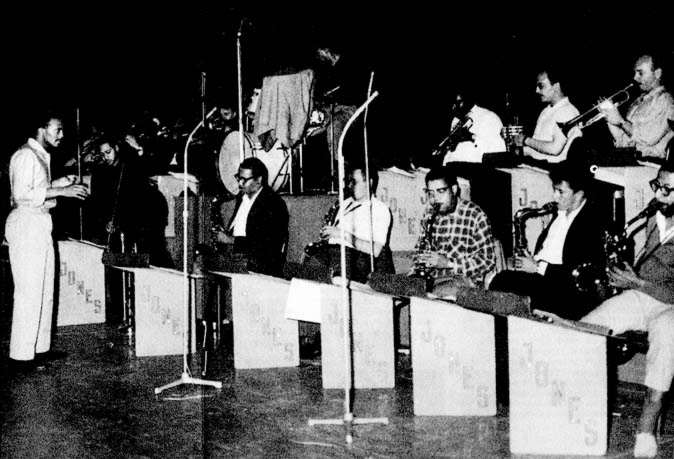
The studio with the 1200 matrix series may have been MBS Recording. We know that MBS was the venue for the label's unissued Shakey Jake session.

Porter Kilbert (as); Fortunatus Paul "Fip" Ricard (tp); Hobart Dotson (tp, arr); Lewis "Bill" Ogletree (tp); Johnny Avant (tb); Eddie Williams (ts); McKinley "Mac" Easton (bars); Billy Wallace (p); Eddie Calhoun (b); Vernel Fournier (d, cowbell).
Chicago, c. February 1957
| 1261 | Swinging with a Mombo [sic] (Kilbert) | Ping 1007 | |
| 1262 | Lee's Bounce (Kilbert) | Ping 1007 | |
| unidentified title | Ping (unissued) | ||
| unidentified title | Ping (unissued) |
The personnel are derived from Tom Lord's Jazz Discography. However, Lord has a "Fip Richard" on trumpet, and an unidentified drummer. Vernel Fournier confirmed that he was behind the drums on this session.
Ping 1007 was released in March 1957, on 78 and 45 rpm. The faintest of noises was made about it in Cash Box, March 30, 1957, p. 42: "Ping, out with another catchy deck entitled 'Lee's Bounce,' expects to announce a new distrib for this area next week." A final reference to Frank Evans' hopes for a few sales mentioned "Swinging with a Mambo" (spelled correctly this time; Cash Box, May 25, 1957, p. 96).

There are no solos on "Swinging," but the tight, well executed arrangement sounds like the work of Hobart Dotson, who for about a year (from May or June 1958 to June 1959) would be playing lead trumpet and writing for Sun Ra's Arkestra; on some live gigs from the period, Dotson was billed as the leader. Interestingly, Hobart Dotson, Eddie Williams, and Eddie Calhoun had also served in the big band that Horace Henderson led (with Porter Kilbert as a featured soloist) during the summer of 1954. And in January 1956, Kilbert was working in the C&C All Stars with a four-horn front line whose other members were Fip Ricard, Tom Archia on tenor sax, and Gus Chappelle on trombone—plus Eddie Calhoun and Vernel Fournier in the rhythm section.
"Bounce" has a trumpet lead by Hobart Dotson, a short bass statement, and a long featured solo by the leader, illustrating the effect Charlie Parker had had on his style by this time. (For more on Hobart Dotson, see the Dotson discography at Michael Fitzgerald - Jazz Research.) On both the 45-rpm and 78-rpm releases, the spelling "Mombo" is used.

The last Ping session featured bluesman Shakey Jake; all that survives is a 45-rpm acetate from MBS Recordings. According to the late George Paulus, who acquired the Shakey Jake acetate in the early 1970s, the single was intended for release but the label went out of business before the plan could be carried out.
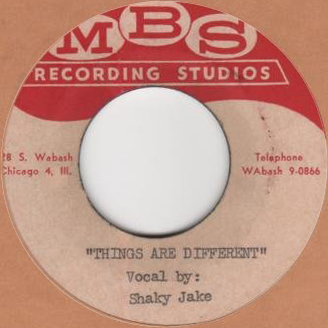
Shakey Jake [Harris] (voc, hca); Magic Sam [Samuel Maghett] (eg); poss. Mack Thompson (eb); unidentified (d).
MBS Recordings, Chicago, 1957
| Angry Lover | Ping (unissued) | ||
| Things Are Different | Ping (unissued) |
According to Tony Burke of Blues & Rhythm, "The first side is yet another clone of Magic Sam's 'All Your Love' and his guitar playing on both sides is unmistakable. The identification of the bass guitar player is tentative but his compatibility with Sam's busy guitar work makes him the obvious candidate." Shakey Jake later recorded for several Chicago labels, including Cobra/Artistic, with Magic Sam's backing.
Speaking of clones, Magic Sam probably recorded "All Your Love" for Cobra in May 1957 (a 5-tune session plus alternate takes, with Mack Thompson on electric bass). His performance was out on Cobra 5013 in June. So which came first, the Magic Sam session or the Shakey Jake session?
The Shakey Jake test pressing bears the logo of MBS Recording Studios on South Wabash Avenue. This was very likely the lower-cost venue that Ping adopted after its one session at Universal.
On April 20, 1957, Billboard ran the last Ping ad that we know of (p. 60). It was not for the company's latest releases. Instead it declared that Ping 1000 was "Breaking Big" (i.e., it was selling slightly better than the other releases) and, in smaller type, "Distributors Wanted." Did Ping ever get a distributor? Tom Kelly remembers opening a package containing Ping 1005 and 1007 while doing some part-time work at a Saint Louis radio station. This was in the early summer of 1957, possibly after the last mention in Cash Box. By then Ping was emitting its last gasps. The company was too small and didn't owe anyone enough money for its passing to merit a notice in the trade press.
Sales figures for the Pings were undoubtedly low, though the releases helped the artists in their search for gigs. Ping recordings are mentioned in 1957 nightclub advertisements for both the Andrew Hill Trio and Porter Kilbert's Combo. According to Anthony Gribin and Matthew Schiff in their book Doo-wop: The Neglected Third of Rock and Roll, the remnants of Ping were acquired by Vee-Jay. We aren't buying this. We've never heard of Vee-Jay master numbers being assigned to the sides, and Vee-Jay never issued anything from Ping.
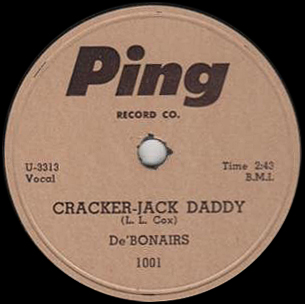
The De'bonairs may have lacked the tight ensemble of the best doowop groups, but their sides are enjoyable and the prominent sax work is a treat. Although their records drew only local sales, the group appeared on "Time for Teens," a popular TV show hosted by DJ Jim Lounsbury. Presumably they had mixed feelings about "Mother's Son" being covered on a February 1957 session for Vee-Jay by Dee Clark and the Kool Gents (billed on that occasion as The Delegates). But they get a chance to perform at a vocal group concert that the Kool Gent himself organized, which took place at Hyde Park High School in April 1957. Cox recalled (in his letter of October 8, 1987) that the group later recorded for the Chess brothers. Around January 1958, the De'bonairs accompanied Lula Reed on "Anything to Say You're Mine" (matrix 8724, released on Argo 5298). Three unissued sides (matrix numbers 8721 through 8723; file titles, in order, were "Whop Whop Sho Wo Wo," "My Heart Goes Boom," and "Repeat That Please") were attributed in the notoriously inaccurate Chess master list to the "Debutantes"; these may well be by the De'bonairs, as Cox recalled making two tracks that were not released. By this time, Homer Talbert may have replaced Edward Johnson as the bass singer in the group; later in 1958, Richard James replaced Earl Vanorsby as the baritone singer. In August 1959, the group performed at the Chicago Defender's annual Bud Billiken picnic. The group made a final session in 1961 for Bud Brandom's B&F label, resulting in the release of one single, "Fool's Love" b/w "Ah La La"; soul blues singer Billy "the Kid" Emerson produced the date. Thereafter, the De'bonairs became less active, dissolving for good in 1964.
The instrumental tracks by the Andrew Hill trio and combo have been treated more as rumors than realities by jazz critics. Their palpable presence on a CD would go a long way to change some attitudes... Andrew Hill and Malachi Favors were already distinctive voices. Von Freeman, a fully formed artist by this time, had appeared on just one studio session. Pat Patrick had already made several sessions in 1956 with the Sun Ra Arkestra; though more conventional than some of the solos he was laying down with Sun Ra, his contributions here will stand with the best of his early work. Deacon Shinault is a singing gospel preacher, recorded with raw immediacy. The Porter Kilbert session has a precision ensemble, interesting arrangements, and good work by the leader, including his longest solo on record. All of the Pings would bring credit to a postwar Chicago anthology.
None of the musicians who recorded for Ping are still with us.
We suspect that it was after his Ping sides that Andrew Hill did another session in Chicago with Malachi Favors and drummer James Slaughter (a wide range of dates have been given for the session). The LP (see above) was released on the Warwick label in November 1959 as So in Love with the Sound of Andrew Hill. In 1961, Hill relocated to New York to work with Dinah Washington as her accompanist. During 1962-63, Hill worked with Raahsan Roland Kirk and other leaders in Los Angeles, but in 1963 he returned to New York. There for the next several years he recorded a series of musically ambitious albums for the Blue Note label, notably Black Fire (1964), Point of Departure (1965), and Compulsion (1966). Blue Note had built its reputation recording much of the cream of the hard bop artists during the 1950s, but Hill's recordings for the label transitioned the music from hard bop to freer forms. He was soon recognized as an outstanding composer in the jazz idiom, and during the 1970s held various academic posts. He was artist in residence at Colgate University in 1970-71, where he got his doctorate. He toured the United States on the Smithsonian Heritage Program during 1973-74, and in 1975 was awarded a Smithsonian Fellowship. For a time he worked as an associate professor at Portland State University. Hill moved to California in 1977, and his career as a recording artist was reenergized during the 1980s, with such outstanding albums as Shades (1987) and Eternal Spirit (1989). He recorded a CD for Palmetto in 2000 called Dusk. Hill returned to Chicago in 2000 to play at the Chicago Jazz Fest, which reunited him with Von Freeman. It was the first time they had played together since the Ping Records session. In 2002 he was awarded the International Jazzpar Prize. Andrew Hill recorded his last sessions in 2004. On April 20, 2007 he died of lung cancer at his home in Jersey City, New Jersey.
An edited, much earlier version of this page (minus the Shakey Jake item, which we hadn't learned about back then) appeared as "The Ping Records Discography" in Blues and Rhythm No. 129,May 1998, pp. 4-5. Thanks also to Eric LeBlanc for his research on Porter Kilbert's birth and death dates, to Mike Kredinac and Tom Kelly for further help with Ping 1005 and 1007, to Billy Vera for label shots of Ping 1002 and 1003, to Dr. Robert Stallworth for label shots of Ping 1000 and 1001, to George Paulus for scans of the 78 rpm releases of Ping 1000 and 1001 and of the Shaky Jake acetate, and to Big Joe Louis for further research material, including letters from Homer Talbert and Lawrence Cox.
Click here to return to Red Saunders Research Foundation page.